Tourism in Cyprus
Tourism in Cyprus occupies a dominant position in the economy.[1][2] Moreover, it significantly impacts Cyprus culture and its multinational/multicultural development throughout the decades.[3][4] In 2006, the tourism industry contributed 10.7% of the GDP which in real terms it generated a total of US$5,445.0 mn. In the same year, the total employment was estimated at 113,000 jobs. With almost 4 million tourist arrivals per year,[5] it is the 40th most popular destination in the world.[6][7] However, per capita of local population it ranks 6th.[8] Cyprus has been a full member of the World Tourism Organization since 1975.[9]
.jpg)
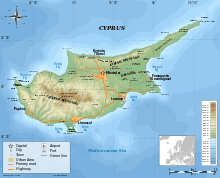
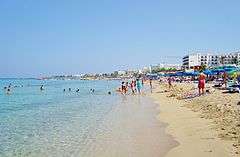
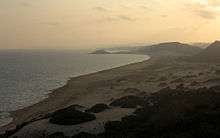
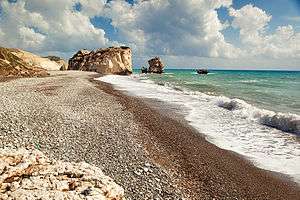
History
Varosha, Famagusta was the most popular destination in Cyprus and one of the most popular destinations in the world until the Turkish invasion of Cyprus in 1974.
Arrivals by country
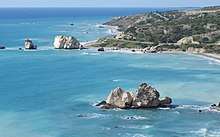
Europe represents the lion's share of tourist arrivals. Over 80% of visitors come from Northern, Western and Eastern Europe, while British tourists remain the most traditional. Several factors contribute to this, including widely spoken English as well as the traditional links from British colonialism and the presence of British military bases at Akrotiri and Dhekelia. The downturn in the British economy in the late 2000s was reflected in a drop in tourist arrivals highlighting the over-reliance of Cyprus' tourist industry on one customer. In 2009 efforts were underway to boost arrivals from other countries.[10] Notably, and inline with the latest geopolitical developments, the second largest segment is Russian tourists - a segment expected to increase even further.[11][12][13]
Total number of tourists in Cyprus in 2018 was 3,938,625. Most visitors arriving to Cyprus on short term basis were from the following countries:[14]
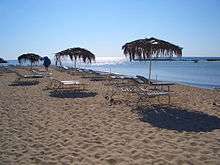
| Rank | Country | 2016 | 2017 | 2018 |
|---|---|---|---|---|
| 1 | 1,157,978 | |||
| 2 | 781,634 | |||
| 3 | 148,739 | |||
| 4 | 124,030 | |||
| 5 | 160,254 | |||
| 6 | 115,019 | |||
| 7 | 42,683 | |||
| 8 | 46,602 | |||
| 9 | 62,292 | |||
| 10 | 28,741 |
Competitiveness
According to the World Economic Forum's 2013 Travel and Tourism Competitiveness Report, Cyprus' tourism industry ranks 29th in the world in terms of overall competitiveness. In terms of Tourism Infrastructure, in relation to the tourism industry Cyprus ranks 1st in the world.[16] With some of the most popular[17] and cleanest beaches in Europe,[18] much of the tourist industry relies on "sea sun and sand" to attract tourists.[19] This reflects in the seasonal distribution of tourist arrivals with a disproportionate number arriving during the summer months. Whereas most eastern resorts like Protaras and Ayia Napa attracts the most of the island tourists during March to November, the west of the island remains open to tourism with the promotion of Cypriot history culture and specialized sports such as golf and climbing has a wider distribution.
Investment
The World Travel and Tourism Council 2016 report on the island outlines that the total investment in the Travel & Tourism industry in 2015 was EUR273.7mn, or 14.0% of the total investments. It projects a rise by 5.3% in 2016 and 2.9% pa over the next ten years to EUR384.6mn in 2026.[20]
Blue Flags
According to the latest KPMG report, Cyprus has the most dense concentration of Blue Flag beaches of which the most at the eastern part, the most Blue Flag beaches per coastline and the most Blue Flags per capita in the world.[21]
Language & service
English is the universal language since the island has an international outlook.[22] French and German are also well spoken within the tourist industry.[23] Greek and Turkish remain the main languages spoken by the Greek-Cypriot and Turkish-Cypriot communities respectively.
Personnel & education
In 2012, Eurostat reported that Cyprus is the most educated country in Europe after Ireland since 49.9% of Cyprus’s residents have degrees.[24] In 2013, only three other EU Member States invested more public funds in education than Cyprus, as measured by the share of GDP (6.5% compared to a 5.0% EU average).[25]
The Cyprus Tourism Organisation (CTO)
The Cyprus Tourism Organisation, usually abbreviated to CTO, and known as KOT in Greek, was a semi-governmental organisation charged with overseeing the industry practices and promoting the island as a tourism destination abroad. In 2007 the CTO spent a reported €20 million on promotion.[26] In 2019 the CTO was replaced by a government ministry, the Deputy Ministry of Tourism, which took over the assets and responsibilities of the CTO.
See also
References
- "Cyprus Travel & Tourism - Climbing to new heights". Accenture. World Travel and Tourism Council. 2006. Archived from the original (PDF) on February 12, 2012. Retrieved 2007-03-02.
- Cyprus Profile: Cruising to Growth
- Ayres, R. (2000) ‘Tourism as a passport to development in small states: Reflections on Cyprus’, International Journal of Social Economics, 27(2), pp. 114–133. doi: 10.1108/03068290010308992
- PwC: Opening the vault of tourism in Cyprus
- "Historic number of tourist arrivals in 2018 with 3.93m visitors". 2019-01-17.
- Moody's: Cypriot banks benefit from strong tourism in 2016
- CTO eyes nearly three million tourists in 2016
- "Economy Statistics - Tourist arrivals (per capita) (most recent) by country". Nationmaster. Retrieved 2010-01-29.
- "UNWTO member states". World Tourism Organization (UNWTO). Archived from the original on 2006-06-20. Retrieved 2007-03-02.
- "Cyprus taps new markets amid decline in tourist arrivals". Xinhua. March 23, 2009. Retrieved 2009-03-23.
- SigmaLive: Russian tourism: Cyprus and Greece in top choices
- Gold News: Russian Tourism: Increase in Demand for Holidays in Cyprus and Greece
- KiprinForm: Why do Russians choose Cyprus?
- ARRIVALS OF TOURISTS BY COUNTRY OF USUAL RESIDENCE
- Including Liechtenstein.
- "Travel and Tourism Competitiveness Index". World Economic Forum. 2011. Retrieved 2011-06-01.
- "Revealed: Europe's best beach getaways". The Independent. London. 2011-04-05.
- "EU bathing water continues to improve, says report". BBC News. 2013-05-21.
- Habegger, Larry (2007-06-10). "World Watch - European Clean Beaches". Chicago Tribune. Retrieved 2007-06-11.
- World Travel and Tourism Council: Travel & Tourism - Economic Impact 2016 Cyprus
- KPMG: Cyprus Tourism Market Report
- Trip Advisor: Cyprus: Important Phrases
- KiprInform: Which language do they speak in Cyprus?
- University World News: Ireland the most educated country in EU, says Eurostat
- European Commission: Education and Training Monitor 2015 Cyprus
- "Cyprus to spend a mere EUR 20 mln to promote tourism in 2008". Financial Mirror. 2007-08-17. Archived from the original on 2007-09-28. Retrieved 2007-08-19.
